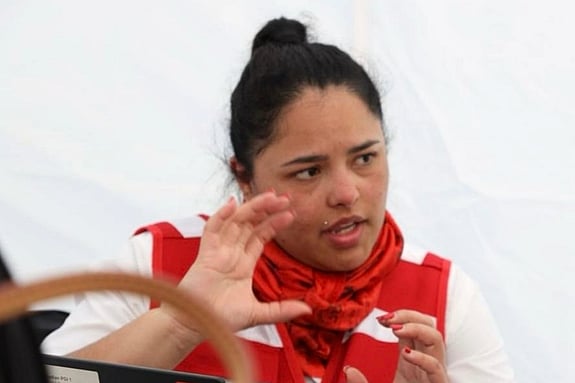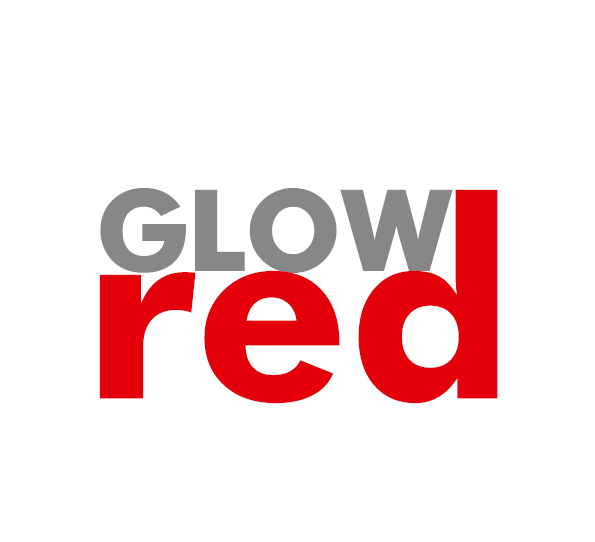“I don’t do this as a job, I do this as a commitment to life”
Lina Garcia has been working with the Red-Cross Red-Crescent Movement for 11 years and now serves as an IFRC Operations Coordinator for Central and Eastern Europe Floods. A dedicated humanitarian who grew up without role models, she is now inspiring others and actively shaping the future of humanitarian action every day.

I joined the Red Cross Red Crescent Movement through the Colombian Red Cross in 2014 as an intern. Looking back, it feels like life led me there in unexpected ways. My first interaction with the Red Cross happened years earlier in the United States when I was in a vulnerable situation and needed donated clothes from the AmericanRed Cross. To me, they were saviors, though I never imagined I would later become part of the organization.
When the opportunity to intern at the Colombian Red Cross arose, I hesitated. I thought,"I'm not a doctor, I'm not a nurse," but then I learned about their international cooperation department. After the interview, where I met someone who would become my mentor—this hilarious, brilliant man who had spent 25 years in the Red Cross—I thought, "Why not?" The organization had helped me once; now, maybe I could be part of something good. It was then that I started as an intern, then became a staff member, and eventually a volunteer.
Once theRed Cross enters your life, it never really leaves. You never forget those who helped you when you needed it most. The emblem itself carries so muchmeaning—it's not just a symbol; it's a sign of trust, a brand people recognize and believe in. That sense of credibility and purpose made me want to be part of it.
Professionally, the Red Cross shaped me in ways I never imagined. I started in a National Society, juggling many responsibilities, but it opened doors. It gave me international experience, allowing me to work as a Protection, Gender, and Inclusion advisor for the Canadian Red Cross and eventually with the British government. The Red Cross experience gave me an edge. It taught me about community, about reality, and gave me the privilege of working for people whose voices are often unheard. This isn’t just a job for me; it’s a commitment to life.
”She was strong, confident, and commanded a room full of men with just a few words. I remember thinking, "I want to be like her." This was Joanna Radziukiewicz.”
One of my most memorable experiences happened in Belize. I was there for a mission, working on PGI and safeguarding activities. When I arrived, a little girl caught my attention. She never spoke to me, just observed. Her mother explained that doctors had diagnosed her with autism. On the last day, she handed me a drawing. It showed her and me, with hearts and the Red Cross emblem. Later, as we were having lunch, she finally spoke. In Spanish, she said, "Miss Lina, I never thought that a woman could be powerful." Those words hit me straight in the heart. They reminded me of why I do this work.
Growing up, I never had a role model. I was the first in my family to receive higher education. Then, at 18, I met a woman who changed everything for me. I was at a Movement coordination meeting with representatives of several National Societies and the ICRC. The representatives were all men, with huge egos, all talking at the same time without getting to any conclusions. Then, there was this blond, blue eyed, tall, beautiful woman with an amazing sense of style who spoke very assertively to address all the men in the room, managed to bring the conversation to a good port and got all the actors aligned. She was strong, confident, and commanded a room full of men with just a few words. I remember thinking, "I want to be like her." This was Joanna Radziukiewicz. And here I was, years later, unknowingly becoming that role model for another little girl.
But the journey hasn’t been without challenges. Women in humanitarian work still face systemic barriers. When I got pregnant in 2021, I realized I couldn’t continue working in emergency operations the same way. Unlike men, I didn’t have institutional support for childcare. Many women in leadership roles within the Movement are single, likely because they had to choose between career and family. Gender equality within the Red Cross Red Crescent still has a long way to go.
”I believe in a different kind of leadership—one rooted in emotional intelligence, humanity, and care for people, not just procedures.”
There have been other challenges too. Being a Colombian woman in an international setting comes with stereotypes—sometimes flattering, sometimes limiting. I’ve had to be cautious about how friendliness is perceived. Then, there’s the traditional leadership style within the Movement. I was once told I wasn’t ready for a leadership role because my personality didn’t "showcase the seniority it should." But I believe in a different kind of leadership—one rooted in emotional intelligence, humanity, and care for people, not just procedures.
I dream of a Red Cross Red Crescent Movement where gender considerations are so naturally embedded in operations that we no longer have to fight for them. A Red Cross that truly reflects humanity in every decision. And personally, I dream of a future where I can balance this passion with the family I hope to have.
The Red Cross changed my life. And every day, I strive to pass that impact on to others.
Lina Garcia, IFRC
